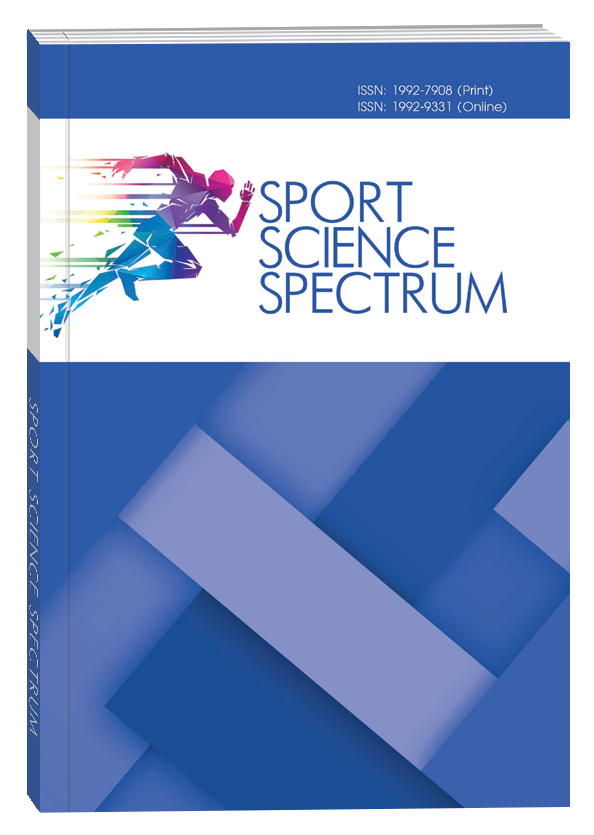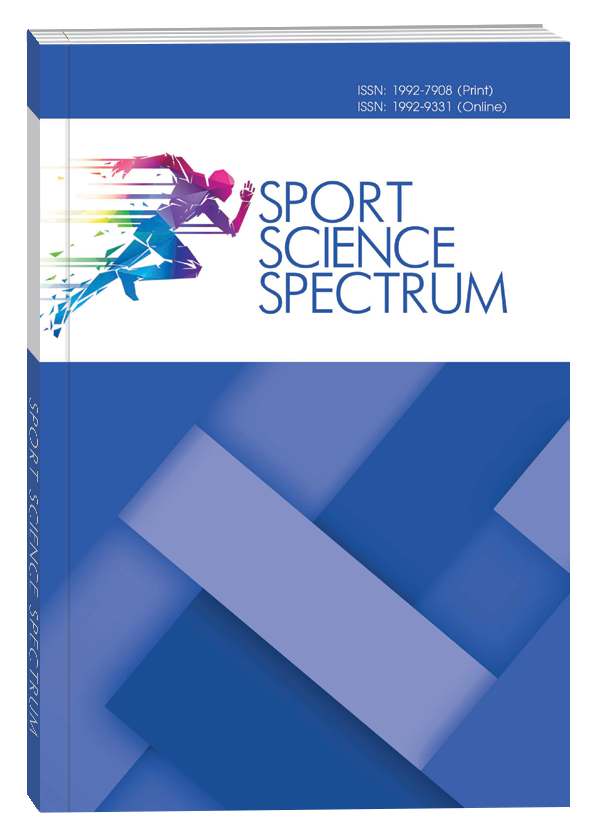CAPABILITY, OPPORTUNITY, AND MOTIVATION OF COACHES TO WORK BASED ON INCLUSIVITY PRINCIPLES: A CORRELATIONAL STUDY
DOI:
https://doi.org/10.32782/spectrum/2024-4-8Keywords:
inclusion, sports, COM-B, training, athletes with special educational needsAbstract
The study focuses on analyzing coaches’ readiness to work with athletes with special educational needs (SEN) through the lens of the COM-B model, which considers capability, opportunity, and motivation for behavior. Particular attention is given to the impact of professional training, experience with inclusive groups, and coaches’ self-identification as (non)inclusive on their behavior when interacting with athletes. The findings will contribute to the development of recommendations for implementing inclusive practices in sports.Objective: To determine the statistical relationship between variables reflecting coaches’ perceptions of their capability, opportunity, and motivation to train athletes with SEN using the COM-B model.Materials and Methods: The survey, conducted from September 2023 to March 2024, involved 379 Ukrainian coaches representing 58 sports disciplines, with an average age of 37 (±14) years. Data collection was performed via Google Forms, and statistical calculations were carried out using IBM SPSS Statistics. A Sankey diagram was created to illustrate response flow trends between questions. The methods employed included questionnaires, Spearman’s correlation coefficient, Cronbach’s alpha coefficient, Pearson’s chi-square test for consistency (x2), and general scientific methods.Results: A high level of statistical correlation was observed in responses to questions about various aspects of coaches’ capability to train athletes with SEN. These included required knowledge, technical and tactical skills, and interpersonal communication abilities, all of which correlated with the coaches’ completion of relevant training and access to methodological resources. Access to such resources was further linked to the availability of necessary equipment and conditions for training athletes with SEN. Additionally, social support from the sports organization was found to correlate with the level of peer support among colleagues. The study revealed that only 35,4% of respondents reported having completed relevant training, 24% indicated they currently coach individuals with SEN, and 28,8% considered themselves inclusive coaches. A statistically significant correlation was established between responses regarding completion of training on inclusive topics and having experience in coaching athletes with SEN (rs = 0,190; p < 0,001), as well as between this experience and self-identification as an inclusive coach (rs = 0,242; p < 0,001). The internal consistency of the survey elements was high (Cronbach’s alpha = 0,945).
References
1. Рівень залученості дітей та молоді до рухової і фізичної активності та вплив спорту на фізичне і ментальне здоров’я : звіт за результатами дослідження. Київ, 2023. 62 с. URL: https://dismp.gov.ua/wp-content/uploads/Zvit_ruhova-aktivnist.pdf.
2. Шевчук О., Когут І., Маринич В. Бібліометричний аналіз наукових публікацій за напрямом «Інклюзія у спорті» у базі даних “Web of Science Core Collection”. Теорія і методика фізичного виховання і спорту. 2023. № 1. С. 75–83. URL: https://doi.org/10.32652/tmfvs.2023.1.75-83.
3. Шевчук О., Когут І., Маринич В. Методичне забезпечення як важлива складова імплементації інклюзивності у спорті. Спортивна медицина, фізична терапія та ерготерапія. 2023. № 2. С. 66–76. URL: https://doi.org/10.32652/spmed.2023.2.66-76.
4. Шевчук О., Когут І., Маринич В. Організаційні засади реалізації інклюзивності у спорті. Теорія і методика фізичного виховання і спорту. 2023. № 3. С. 86–95. URL: https://doi.org/10.32652/tmfvs.2023.3.86-95.
5. Шевчук О., Когут І., Маринич В. SWOT-аналіз імплементації інклюзивності в роботу тренерів. Фізичне виховання, спорт і культура здоров’я в сучасному суспільстві. 2024. № 3 (67). С. 67–74. URL: https://doi.org/10.29038/2220-7481-2024-03-67-74.
6. Storr R., Jeanes R., Rossi T., Hunter L. Are we there yet? (Illusions of) Inclusion in sport for LGBT+ communities in Australia. International review for the sociology of sport. 2021. P. 101269022110140. URL: https://doi.org/10.1177/10126902211014037.
7. Chiner E., Cardona M.C. Inclusive education in Spain: how do skills, resources, and supports affect regular education teachers’ perceptions of inclusion? International Journal of Inclusive Education. 2013. Vol. 17. № 5. P. 526–541. URL: https://doi.org/10.1080/13603116.2012.689864.
8. Chow W.S.E., Sharma U. Are in-service teachers supported in Hong Kong? Teachers’ perceived support needs in the implementation of inclusive educa- tion. International Journal of Inclusive Education. 2022. P. 1–17. URL: https://doi.org/10.1080/13603116.2022.2118379.
9. D’Angelo C., Corvino C., Gozzoli C. The Challenges of Promoting Social Inclusion through Sport: The Experience of a Sport-Based Initiative in Italy. Soci- eties. 2021. Vol. 11. № 2. P. 44. URL: https://doi.org/10.3390/soc11020044.
10. Fari G. Sports for people with disabilities: A way for rehabilitation and social inclusion. Journal of Back and Musculoskeletal Rehabilitation. 2023. Vol. 36. № 6. P. 1217–1218. URL: https://doi.org/10.3233/bmr-235004.
11. Lange S., Bolt G., Vos S., Völker B. Inclusion of the Marginalized: The Case of Sport Participation. Journal of Global Sport Management. 2024. P. 1–29. URL: https://doi.org/10.1080/24704067.2024.2317121.
12. Campos M.J., Pečnikar Oblak V., Massart A., Ljubotina P., Perényi S., Farkas J., Sarmento H., Doupona M. Listening to Stakeholders’ Voices on Funding Social Inclusion in Sport for People with Disabilities – Proposal for Criteria. Sports. 2024. Vol. 12. № 6. P. 147. URL: https://doi.org/10.3390/sports12060147.
13. Anderson A., Dixon M.A., Oshiro K.F., Wicker P., Cunningham G.B., Heere B. Managerial perceptions of factors affecting the design and delivery of sport for health programs for refugee populations. Sport Management Review. 2019. Vol. 22. № 1. P. 80–95. URL: https://doi.org/10.1016/j.smr.2018.06.015.
14. Folostina R., Dumitru C., Iacob C.I., Syriopoulou-Delli C.K. Mapping Knowledge and Training Needs in Teachers Working with Students with Autism Spectrum Disorder: A Comparative Cross-Sectional. Sustainability. 2022. Vol. 14. № 5. P. 2986. URL: https://doi.org/10.3390/su14052986.
15. McMaster S., Culver D., Werthner P. Coaches of athletes with a physical disability: a look at their learning experiences. Qualitative Research in Sport, Exercise and Health. 2012. Vol. 4. № 2. P. 226–243. URL: https://doi.org/10.1080/2159676x.2012.686060.
16. Michie P.S., Atkins D.L., West P.R. The behaviour change wheel: A guide to designing interventions. Silverback Publishing, 2014. 332 p.
17. Michie S., van Stralen M.M., West R. The behaviour change wheel: A new method for characterising and designing behaviour change interventions. Implementation Science. 2011. Vol. 6. № 1. URL: https://doi.org/10.1186/1748-5908-6-42.
18. Nilsen S. Inside but still on the outside? Teachers’ experiences with the inclusion of pupils with special educational needs in general education. Interna- tional Journal of Inclusive Education. 2018. Vol. 24. № 9. P. 980–996. URL: https://doi.org/10.1080/13603116.2018.1503348.
19. Borland R.L., Hu N., Tonge B., Einfeld S., Gray K.M. Participation in sport and physical activity in adults with intellectual disabilities. Journal of Intellectual Disability Research. 2020. Vol. 64. № 12. P. 908–922. URL: https://doi.org/10.1111/jir.12782.
20. Shevchuk O., Kohut I., Marynych V. Coaches readiness to work with athletes with special educational needs: a nationwide study based on the COM-B model. Slobozhanskyi Herald of Science and Sport. 2024. Vol. 28. № 4. P. 175–184. URL: https://doi.org/10.15391/snsv.2024-4.001.





